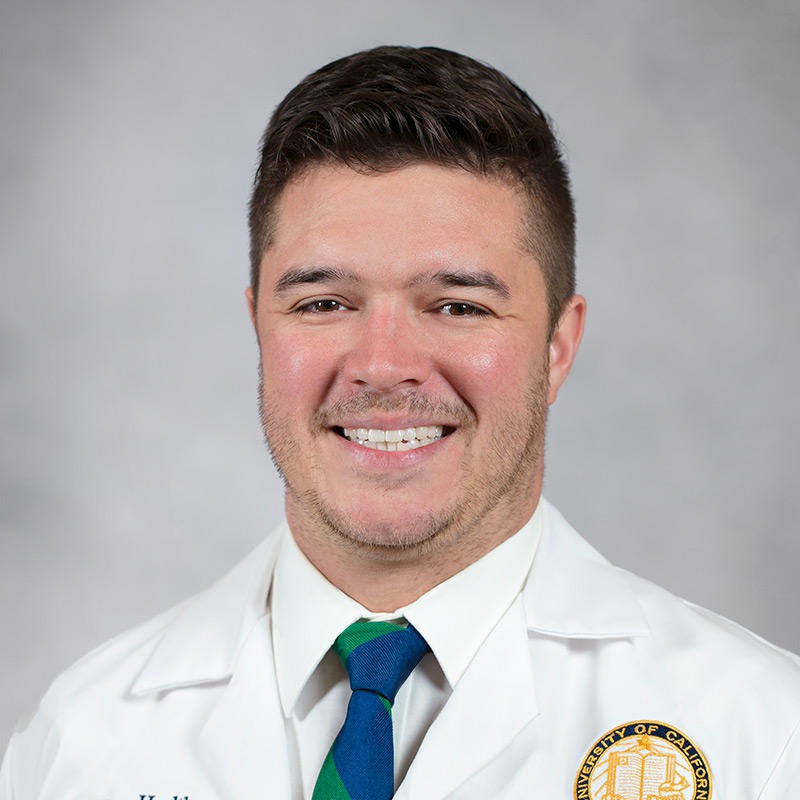-

-
 Brenton S. Alexander, MD is a board-certified anesthesiologist and associate professor at UC San Diego. His research focuses on advancing perioperative care through innovations in regional anesthesia, pain management, and hemodynamic optimization. He has investigated novel approaches to improve postoperative analgesia and reduce opioid requirements, including novel regional techniques. His collaborative work has also advanced individualized fluid management and closed-loop hemodynamic systems to optimize tissue perfusion during high-risk surgery. Dr. Alexander integrates clinical trials, translational studies, and cohort analyses to evaluate anesthetic drug effects, enhance recovery pathways, and refine perioperative monitoring. His overarching goal is to develop patient-centered, precision-based strategies that improve outcomes, minimize complications, and accelerate recovery after surgery.
Brenton S. Alexander, MD is a board-certified anesthesiologist and associate professor at UC San Diego. His research focuses on advancing perioperative care through innovations in regional anesthesia, pain management, and hemodynamic optimization. He has investigated novel approaches to improve postoperative analgesia and reduce opioid requirements, including novel regional techniques. His collaborative work has also advanced individualized fluid management and closed-loop hemodynamic systems to optimize tissue perfusion during high-risk surgery. Dr. Alexander integrates clinical trials, translational studies, and cohort analyses to evaluate anesthetic drug effects, enhance recovery pathways, and refine perioperative monitoring. His overarching goal is to develop patient-centered, precision-based strategies that improve outcomes, minimize complications, and accelerate recovery after surgery.
-

-

-

-

-

-
- Psychedelics for Phantom Limb Pain - Evaluating the effects of psilocybin vs Niacin on phantom limb pain and the potential neural mechanisms of this effect in a RCT with fMRI evaluations of functional connectivity changes between pre and post psilocybin.
-
The Gabriel Laboratory in the Division of Perioperative Informatics at UC San Diego Department of Anesthesiology pioneers the use of artificial intelligence to improve perioperative and pain‐medicine patient outcomes. The group integrates diverse data sources—including electronic health records, social determinants of health, omics (genomic, microbiome, metabolomic), imaging data, and unstructured clinical text—to develop predictive models for high‐risk states such as opioid addiction, persistent pain after surgery, and critical care outcomes . The team also works on frailty detection, operating room and surgery center efficiency, and risk stratification for surgical patients. A core objective is translating these models into clinical decision support tools that are transparent, fair, and reproducible. The lab is funded by Wellcome Leap, National Institutes of Health, and the Anesthesia Patient Safety Foundation. Dr. Gabriel is also an affiliate faculty member of the Jacobs Center for Health Innovation to integrate AI into preoperative workflows. Their work aims not just to predict but to improve care, optimize resources, and reduce harm.
-
Dr. Ilfeld devotes his full professional effort (1.0 FTE) to clinical research, encompassing the entire spectrum from exploratory pilot studies to large, federally funded multicenter trials. His work spans all phases of investigation, from developing and evaluating novel analgesic devices and pharmacotherapies to definitive clinical trials. Ongoing projects address both acute and chronic pain, utilizing approaches such as ambulatory and inpatient continuous peripheral nerve blocks, liposomal bupivacaine, ultrasound-guided percutaneous cryoneurolysis, percutaneous peripheral nerve stimulation, auricular neuromodulation, and pulsed shortwave (radiofrequency) therapy.
-

-

-
 The Lerman Lab, led by Dr. Imanuel Lerman, is at the cutting edge of bioelectronic medicine research, focusing on innovative approaches to detect and treat inflammation through advanced technologies. The lab is pioneering the development of closed-loop systems that integrate focused ultrasound, autonomic neurography (ANG), and artificial intelligence to monitor and manage inflammatory conditions and inflammatory mediated chronic pain. With a commitment to non-invasive therapies, the Lerman Lab is dedicated to improving clinical outcomes, leveraging a collaborative approach with industry partners and integrating state-of-the-art biosensors and cloud platforms into their research with the aim to improve patients lives and health-span.
The Lerman Lab, led by Dr. Imanuel Lerman, is at the cutting edge of bioelectronic medicine research, focusing on innovative approaches to detect and treat inflammation through advanced technologies. The lab is pioneering the development of closed-loop systems that integrate focused ultrasound, autonomic neurography (ANG), and artificial intelligence to monitor and manage inflammatory conditions and inflammatory mediated chronic pain. With a commitment to non-invasive therapies, the Lerman Lab is dedicated to improving clinical outcomes, leveraging a collaborative approach with industry partners and integrating state-of-the-art biosensors and cloud platforms into their research with the aim to improve patients lives and health-span. -

Albert Y. Leung, M.D., is a Professor of Anesthesiology and Pain Medicine at the University of California, San Diego, School of Medicine. He is the founding Director of the Center for Pain and Headache Research at the VA San Diego Healthcare System (VASDHS) and a Research Scientist for the Veteran Medical Research Foundation. He is the lead author in the INS-NANS Expert Review and Recommendation paper for TMS in Pain and Headache Treatment.
He receives funding from DOD, VA Office of Research and Development and NIH for his research projects focusing on the mechanisms and effectiveness of non-invasive brain and peripheral stimulation and incorporating machine learning for nerve functional restoration and headache/pain relief. He founded the first Transcranial Magnetic Stimulation (TMS) clinical unit for pain and headache treatment in the VA healthcare system over a decade ago. He now directs the Center for TMS at the VASDHS
-

-

- Dr. Angela Meier is a board-certified anesthesiologist and intensivist who bridges clinical expertise with laboratory research.
- The Meier Lab investigates how anesthetics, sedatives, and novel immune-modulating nanoparticles influence immune responses, both in vitro and in the context of infections such as severe pneumonia and sepsis
- Dr. Meier’s clinical research interests are deeply integrated with her medical practice, encompassing mechanical ventilation, ECMO, sepsis, leadership in cardiopulmonary resuscitation and critical care for patients with lung and heart transplantation
-

- Principal Investigator, Online Physical Therapy Videos, UC San Diego, 2020-Present - Created a series of online physical therapy videos to treat the most commonly encountered painful conditions in EDs and outpatient clinics. Studying patient and provider satisfaction.
-
Principal Investigator, Teachability of the Erector Spinae, UC San Diego, 2020-Present -Assessment of the use of QR codes for the use of home instructional discharge videos
-
Principal Investigator, Ultrasound Guided Nerve Block Curriculum, UC San Diego 2025 - Created a nerve block curriculum for emergency medicine residents and implemented QR codes in the ED for point-of-care reference.
- Principal Investigator, Improving ED Migraine Management, UC San Diego 2025 - Principal Investigator on a project to improve emergency department migraine management using novel CGRP analogs by developing an EPIC order set for standardized, evidence-based treatment.
- Sub-Investigator, phase 1 clinical trial 2024-2025, 10% funding, 2025-2026 - NIH/NIAAA R44 AA024905. $1,600,000 2024-2025 Nezavist, A Novel Molecule for Treatment of Alcohol Use Disorder
-

-

-

-
-

-

- EN21 -Phase 2 RCT studying novel medication for painful diabetic peripheral neuropathy
- RELIEV-CM2- Pivotal RCT studying novel implantable device for refractory chronic migraine
-

-

Michael Vaninetti, M.D. is an Associate Professor of Anesthesiology and a Pain Medicine physician at UC San Diego and the VA San Diego Healthcare System. His research focuses on neuromodulation and interventional pain therapies, including transcranial magnetic stimulation for phantom limb pain and chronic headaches, as well as the development and evaluation of novel medical devices. He is actively involved in studies aimed at improving procedural techniques and outcomes in chronic pain management.
-
 Dr. Wallace received his MD from Creighton University School of Medicine in 1987. He completed an Anesthesiology residency at the University of Maryland followed by an NIH training grant fellowship and a Clinical Pain Fellowship in the Department of Anesthesiology, University of California San Diego (UCSD). He is Professor of Anesthesiology and the past Chief, Division of Pain Medicine in the Department of Anesthesiology, UCSD School of Medicine and has over 30 years experience providing care for chronic pain, conducting clinical research and training Pain Fellows. He is also Co-Director, Division of Clinical Research Services in the UCSD Altman Clinical and Translational Institute (ACTRI) and Co-Investigator on the UCSD CTSA grant. He oversees an 18,000 sq ft research clinic which supports the UCSD clinical investigators across all disciplines. He has numerous current and past NIH and state grants supporting early phase clinical trials with novel therapeutics and medical cannabis.
Dr. Wallace received his MD from Creighton University School of Medicine in 1987. He completed an Anesthesiology residency at the University of Maryland followed by an NIH training grant fellowship and a Clinical Pain Fellowship in the Department of Anesthesiology, University of California San Diego (UCSD). He is Professor of Anesthesiology and the past Chief, Division of Pain Medicine in the Department of Anesthesiology, UCSD School of Medicine and has over 30 years experience providing care for chronic pain, conducting clinical research and training Pain Fellows. He is also Co-Director, Division of Clinical Research Services in the UCSD Altman Clinical and Translational Institute (ACTRI) and Co-Investigator on the UCSD CTSA grant. He oversees an 18,000 sq ft research clinic which supports the UCSD clinical investigators across all disciplines. He has numerous current and past NIH and state grants supporting early phase clinical trials with novel therapeutics and medical cannabis.
-

